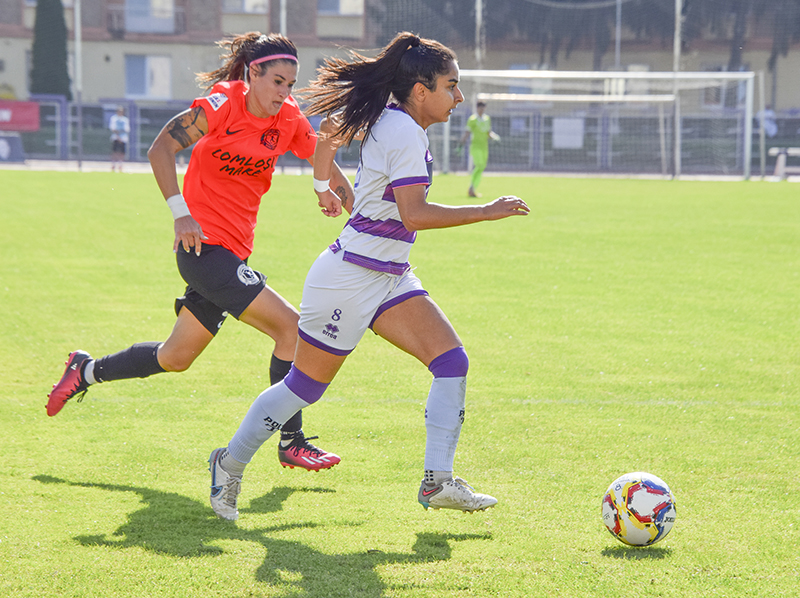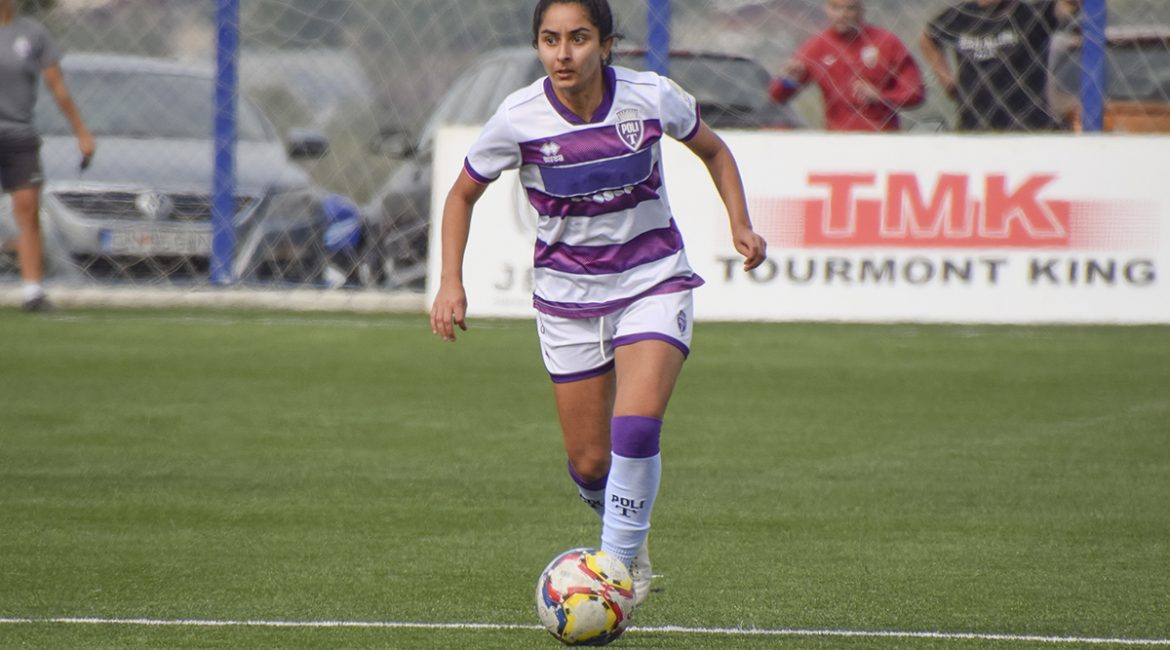Dyana Dawood s-a alăturat Politehnicii Timișoara în această vară. Simpatica americancă de origine irakiană s-a integrat rapid în grupul alb-violet, a jucat în toate meciurile din această toamnă, acumulând 777 de minute, marcând și un gol în meciul de pe Știința cu Banat Girls. Este prima stranieră pe care o vom cunoaște mai bine, urmând o serie de interviuri cu jucătoarele din străinătate venite în 2023 la echipa noastră.
Povestește-ne puțin despre copilăria ta, familia ta. Știm că te-ai născut în Irak într-o perioadă dificilă.
M-am născut într-o familie asiriană în Ninive, Mosul de astăzi, Irak. Când eram mică, a izbucnit războiul din Irak, care mi-a schimbat tot cursul vieții. Părinții mei au vrut să pună pe primul loc viitorul fraților mei și al meu, acest lucru i-a determinat să ia decizia să părăsească definitiv țara. Lucrurile se agravau, fiind localnici și creștini, eram o țintă de persecuție. Acest lucru a îngreunat condițiile de trai, așa că fuga era singura opțiune la acea vreme. Cu ajutorul Națiunilor Unite am plecat în Iordania în anul 2004. Copilăria mea din Irak a constat în încercarea de a sta cât mai în siguranță pentru că erau lansate bombe și alte atacuri în jurul nostru. În Iordania, copilăria mea a fost asemănătoare cu cea a copiilor care au crescut acolo la acea vreme. Nu erau prea multe lucruri de făcut în afară de a ne juca împreună cu ceilalți copii din cartier. Am fost la școală în Iordania cu ajutorul Națiunilor Unite, care s-a ocupat de toate aspectele legale. În afară de mers la școală, am stat mult pe afară în cartier cu copiii sau am stat împreună cu familia.
Cum ai început să joci fotbal?
Primele mele amintiri despre fotbal sunt pe străzile Iordaniei, jucam cu băieții din cartier. Era un lucru pe care îl făceam zilnic și îmi amintesc că eram singura fată de acolo. Vin dintr-o familie cu experiență mare în fotbal, tatăl meu pe vremea aceea antrenând o echipă locală din Iordania, așa că am fost mereu cu el în acest mediu fotbalistic. Apoi, mai târziu, în 2008, am plecat în SUA și am crescut pas cu pas în academiile din diversele zone ale țării.
Ai jucat mereu ca mijlocaș sau și pe alte posturi?
În principal, da, am jucat ca mijlocaș central. S-a întâmplat să joc și ca extremă sau ca al doilea atacant.

De ce ai ales România și Poli?
Fiind primul meu sezon în străinătate, mi-am dorit să joc într-o țară în care fotbalul feminin este în creștere. Să vin la Poli a fost o decizie ușoară datorită faptului că mi-a plăcut modul în care se conduce clubul, oamenii sunt profesioniști, începând cu antrenorul principal și lotul grozav de jucătoare care poate câștiga multe meciuri. Mi-a plăcut și ideea de a locui într-un oraș european frumos.
Cum ți se pare fotbalul din România, comparativ cu cel din SUA?
România are o cultură a fotbalului de generații întregi. În SUA, școlile reprezintă o parte importantă a sistemului de creștere a juniorilor și aceasta este cea mai mare diferență. După ce ai jucat în cluburi de juniori, urmează să joci în facultate timp de patru ani în trei divizii diferite, ca apoi să fii recrutat în liga locală care nu merge pe sistemul de promovare/retrogradare. România și Europa sunt foarte diferite de SUA în acest aspect. Aici un jucător junior poate intra în lotul unei echipei de seniori foarte rapid, ori acest lucru nu este posibil în SUA pentru că nu există oportunitatea de a ajunge la nivel de seniori, din cauza sistemului de dezvoltare a juniorilor. Dar, în general, SUA are avantajul de a fi o țară mai mare, cu o populație uriașă în fotbalul feminin, ceea ce înseamnă că aria de selecție este enormă pentru echipele de la colegii și apoi cele profesioniste. Așa se face că echipele continuă să modernizeze stilurile de joc an de an și să mențină un nivel ridicat al competiției. În ceea ce privește fotbalul în sine, sunt multe aspecte asemănătoare, diferă însă modul de organizare.
Ce ai studiat la facultate și care îți este planul B, pe lângă fotbal?
Am studiat psihologia comportamentală și kinesiologie. Plănuiesc să îmi continui studiile pentru a obține diploma de master. Mai târziu mi-ar plăcea să am o carieră care să fie legată de educația mea și experiența de viață acumulată.
Care este cel mai frumos moment trăit cu Poli până acum?
Am avut multe momente frumoase, dar remarc victoria de la Constanța, când am întors scorul cu Farul.
Un gând la final de an.
Gândurile mele sunt la a doua parte a sezonului. Să îmi reîncarc bateriile acasă pentru a avea o a doua parte mai bună decât prima. Ca echipă, îmi doresc să luam meci cu meci, pas cu pas, să muncim împreună până la finalul campionatului!
__
EN
Tell us a little about your childhood, your family. We know you were born in Iraq during a difficult time.
I was born into an Assyrian family in Nineveh, modern day Mosul, Iraq. When I was young a war had broken out in Iraq and it changed the entire course of my life ever since. My parents wanted to put the futures of my siblings and I first so this led them into making the decision of leaving the country for good. As war broke out in the country, being the native people of the land we were an easy target for prosecution and for also being christians. This made the living conditions hard so fleeing was the only option at the time. Through the help of United Nations we left to Jordan in 2004. My childhood in Iraq consisted of trying to stay as safe as possible because at the time there were bomb strikes and other violences around us. In Jordan, my childhood was similar to many other children who grew up there at the time. There was not much to do besides just playing outside with all the neighborhood kids. I went to school in Jordan through the help of United Nations who took care of all the legal aspects. Other than school, my childhood consisted a lot of being very active outside in the neighborhoods or being around family.
How did you start playing football?
My first memories of football were playing outside in the streets of Jordan with all the boys. It was an everyday thing and I always remember being the only girl there. I come from a family with a big background in football and at that time in Jordan my dad coached a men’s football team, so I was always with him and around the football environment a lot. Then later on in 2008 we left to America and I went up the football ranks through the youth academies in different parts of the US.
Have you always played as a midfielder or in other positions?
Mainly in the center midfield roles. If not, I played as a winger and sometimes as a second striker.
Why did you choose Romania and Poli?
As my first season playing abroad I wanted to play for a country that is going up the ranks in women’s football and growing its league. Poli was an easy decision due to being in a beautiful european city, the way the club is ran/how professional everything is, the head coach, and a great round of players who can win many football matches.
How do you think football in Romania compares to that in the USA?
In Romania the football culture exists and has for generations. In USA schools are a big part of the youth system and this is the biggest difference. The path after playing in youth clubs is to play in college (3 different divisions) for 4 years and after that to get drafted in local league that doesn’t have promotion/regelation. Romania & Europe in general are different in this sense because football can be more emphasized in their youth systems. In Romania any youth player can join the ranks of a senior team. This isn’t possible in the USA because of the lack of opportunity at the senior level due to player development pathways. But USA overall have an advantage of being a bigger country with a huge population in women’s football, which means there are thousands of players to select from in teams from youth to college to pro. This is how teams continue to modernize styles of play year after year and keep the level of competition high. But overall very similar in many aspects in terms of football.
What did you study in college and what is your plan B, besides football?
I studied behavioral psychology, kinesiology, and exercise science. After football I want to continue my education and get my master’s degree. Later on I’d like to have a career that connects to my education and the life experiences I’ve had all together.
What is the most beautiful moment lived with Poli so far?
All the football moments I lived with Poli have been beautiful but the one that stands out to me the most is the comeback win against Farul.
A thought at the end of the year.
My thoughts are on the second part of the season. To recharge now and come back for the second half of the season better than the first. As a team to take it game by game and work together until we are at the end of the championship!

